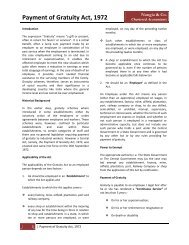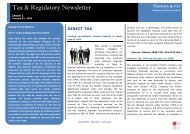DIRECT TAX - Nangia & Co
DIRECT TAX - Nangia & Co
DIRECT TAX - Nangia & Co
You also want an ePaper? Increase the reach of your titles
YUMPU automatically turns print PDFs into web optimized ePapers that Google loves.
Tax & Regulatory Newsletter<br />
Issue 05 – AUGUST, 2010<br />
NANGIA & CO.<br />
Chartered Accountants<br />
New Delhi – Mumbai - Dehradun<br />
originator of the programme, the moment copies were made and<br />
marketed, it became ‘goods’ which were assessable to Sales Tax.<br />
It was held that even intellectual property became ‘goods’ once<br />
put onto a media whether in the form of books or computer disks<br />
or cassettes. Accordingly, profits on sale of software could not be<br />
assessed as ‘Royalty’ either under the Indian Tax Law or under the<br />
DTAA.<br />
[Source: Velankani Mauritius Limited Vs. DDIT (ITAT Bangalore)<br />
dated July 08, 2010]<br />
Royalty paid by Non Resident does not ‘arise’ in India if<br />
there is no ‘economic link’ between the PE and the<br />
Royalty<br />
SET Satellite (Singapore) Limited *“the<br />
taxpayer”+, a tax resident of Singapore,<br />
was engaged in the business of<br />
acquiring television programs, motion<br />
pictures and sports events and<br />
exhibiting the same on its television<br />
channels from Singapore. The taxpayer entered into a contract with<br />
the Global Cricket <strong>Co</strong>uncil, another company based in Singapore for<br />
obtaining the right to broadcast, distribute and exhibit cricket<br />
matches through territories of various countries including India. An<br />
Indian company of the taxpayer was also engaged for undertaking the<br />
marketing activities for the taxpayer. The Assessing Officer concluded<br />
that the taxpayer had a Permanent Establishment in India under the<br />
‘Agency Permanent Establishment rule’ of the Indo-Singapore tax<br />
treaty on account of the marketing activities undertaken by the<br />
Indian company. Upon appeal the first appellate authority ruled in<br />
favour of the taxpayer to which the tax authority preferred an appeal<br />
before the Income Tax Appellate Tribunal.<br />
Before the Income Tax Appellate Tribunal<br />
the taxpayer contended that even if the<br />
payments constituted ‘Royalty’, they did<br />
not arise in India as per the DTAA as the<br />
payment was made by a tax resident of<br />
Singapore. Also, the ‘Royalty’ was not<br />
incurred in connection with the taxpayer’s Permanent Establishment<br />
in India, it was incurred in connection with its broadcasting activities<br />
in Singapore and was independent of the activities of the Indian<br />
company. It was also stated that the ‘Royalty’ was also not borne by<br />
the Permanent Establishment because for it to be construed as being<br />
borne by the Permanent Establishment it should have had an<br />
economic link with the taxpayer’s Permanent Establishment in India.<br />
Reliance was also placed on the OECD commentary on Article 11<br />
dealing with taxation of interest which stated that for interest to<br />
arise, it should have an ‘economic link’ with the Permanent<br />
Establishment.<br />
Page | 6









